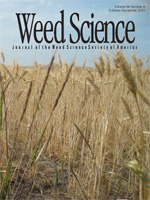Most studies on weed population dynamics in farming systems have focused on the effects of different weed control strategies. Those studies usually assume that farmers, operating within a particular system, have a uniform management style. However, it is likely that weed management decision making also varies between farmers that operate within a system. In this study, the relationship between weed management behavior and the outcome of that behavior within an organic farming system is studied. It is hypothesized that differences in weed pressure between organic farms can be related to differences in farmers' weed management behavior. We explore which weed and general management factors are of main influence on the weed pressure, and investigate the influence of farmer's beliefs and knowledge on weed control techniques and the observed weed pressure. Preventive measures and timing of main soil tillage operation were identified as the weed management factors most influential for weed pressure. With the increasing number of preventive measures applied, weed pressure decreased, with a stale seedbed being the most important preventive measure. The weed pressure increased with the number of days after September 1st on which the main tillage operation was carried out. Because of this postponement of the tillage treatments, the growing season of weeds was extended and more species were able to reproduce before winter, thereby enhancing weed pressure. Field size, rather than weed pressure, determined the number of hand-weeding hours per ha; with increasing field size the amount of hand weeding per surface area was reduced. On farms with lower weed pressures a higher percentage of competitive crops were grown than on farms with higher weed pressures. The farmer's beliefs and knowledge on weed control techniques differed between farmers with different weed pressures. Market-oriented growers had a higher on-farm weed pressure than crop-growth–oriented growers. It was concluded that studies on weed management behavior and the effect of that behavior can lead to a better understanding of farming systems and to more effective weed management in those systems.
How to translate text using browser tools
1 October 2010
Linking Farmer Weed Management Behavior with Weed Pressure: More than Just Technology
Marleen M. Riemens,
Roel M. W. Groeneveld,
Martin J. J. Kropff,
Lambertus A. P. Lotz,
Reint Jan Renes,
Wijnand Sukkel,
Rommie Y. van der Weide
ACCESS THE FULL ARTICLE

Weed Science
Vol. 58 • No. 4
October-December 2010
Vol. 58 • No. 4
October-December 2010
beliefs
hand weeding
management behavior
Organic farming system
weed density
weed seed production




